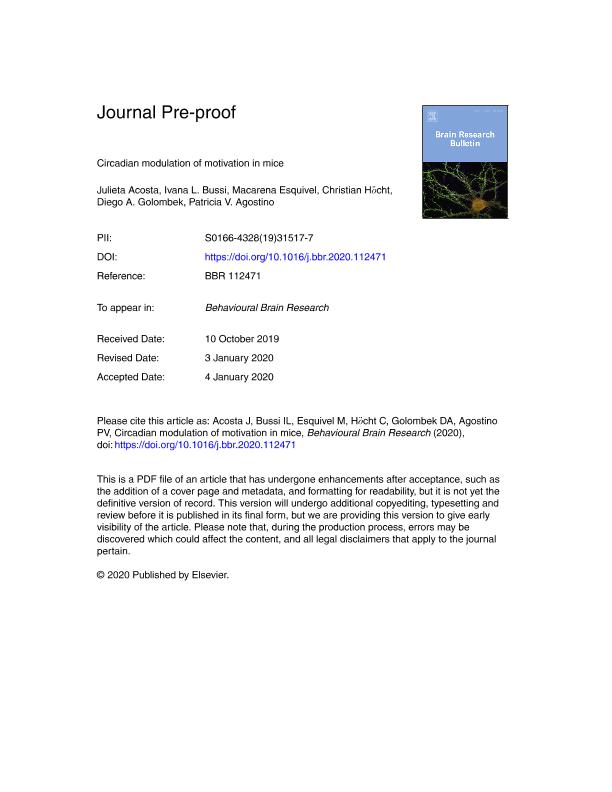Mostrar el registro sencillo del ítem
dc.contributor.author
Acosta, Julieta

dc.contributor.author
Bussi, Ivana Leda

dc.contributor.author
Esquivel, Macarena

dc.contributor.author
Höcht, Christian

dc.contributor.author
Golombek, Diego Andrés

dc.contributor.author
Agostino, Patricia

dc.date.available
2021-11-08T17:37:19Z
dc.date.issued
2020-03-16
dc.identifier.citation
Acosta, Julieta; Bussi, Ivana Leda; Esquivel, Macarena; Höcht, Christian; Golombek, Diego Andrés; et al.; Circadian modulation of motivation in mice; Elsevier Science; Behavioural Brain Research; 382; 112471; 16-3-2020; 1-10
dc.identifier.issn
0166-4328
dc.identifier.uri
http://hdl.handle.net/11336/146309
dc.description.abstract
Most living organisms have a circadian timing system adapted to optimize the daily rhythm of exposure to the environment. This circadian system modulates several behavioral and physiological processes, including the response to natural and drug rewards. Food is the most potent natural reward across species. Food-seeking is known to be mediated by dopaminergic and serotonergic transmission in cortico-limbic pathways. In the present work, we show evidence of a circadian modulation of motivation for food reward in young (4-months old) and aged (over 1.5 years old) C57BL/6 mice. Motivation was assayed through the progressive ratio (PR) schedule. Mice under a 12:12 light/dark (LD) cycle exhibited a diurnal rhythm in motivation, becoming more motivated during the night, coincident with their active phase. This rhythm was also evident under constant dark conditions, indicating the endogenous nature of this modulation. However, circadian arrhythmicity induced by chronic exposure to constant light conditions impaired the performance in the task causing low motivation levels. Furthermore, the day/night difference in motivation was also evident even without caloric restriction when using a palatable reward. All these results were found to be unaffected by aging. Taken together, our results indicate that motivation for food reward is regulated in a circadian manner, independent of the nutritional status and the nature of the reward, and that this rhythmic modulation is not affected by aging. These results may contribute to improve treatment related to psychiatric disorders or drugs of abuse, taking into account potential mechanisms of circadian modulation of motivational states.
dc.format
application/pdf
dc.language.iso
eng
dc.publisher
Elsevier Science

dc.rights
info:eu-repo/semantics/openAccess
dc.rights.uri
https://creativecommons.org/licenses/by-nc-sa/2.5/ar/
dc.subject
CIRCADIAN SYSTEM
dc.subject
DOPAMINE
dc.subject
FOOD REWARD
dc.subject
MOTIVATION
dc.subject
NUCLEUS ACCUMBENS
dc.subject.classification
Biología

dc.subject.classification
Ciencias Biológicas

dc.subject.classification
CIENCIAS NATURALES Y EXACTAS

dc.title
Circadian modulation of motivation in mice
dc.type
info:eu-repo/semantics/article
dc.type
info:ar-repo/semantics/artículo
dc.type
info:eu-repo/semantics/publishedVersion
dc.date.updated
2021-10-29T13:14:26Z
dc.identifier.eissn
1872-7549
dc.journal.volume
382
dc.journal.number
112471
dc.journal.pagination
1-10
dc.journal.pais
Países Bajos

dc.journal.ciudad
Amsterdam
dc.description.fil
Fil: Acosta, Julieta. Universidad Nacional de Quilmes. Departamento de Ciencia y Tecnología; Argentina. Consejo Nacional de Investigaciones Científicas y Técnicas; Argentina
dc.description.fil
Fil: Bussi, Ivana Leda. Universidad Nacional de Quilmes. Departamento de Ciencia y Tecnología; Argentina. University of Washington; Estados Unidos. Consejo Nacional de Investigaciones Científicas y Técnicas; Argentina
dc.description.fil
Fil: Esquivel, Macarena. Universidad Nacional de Quilmes. Departamento de Ciencia y Tecnología; Argentina
dc.description.fil
Fil: Höcht, Christian. Universidad de Buenos Aires. Facultad de Farmacia y Bioquímica. Departamento de Farmacología. Cátedra de Farmacología; Argentina
dc.description.fil
Fil: Golombek, Diego Andrés. Universidad Nacional de Quilmes. Departamento de Ciencia y Tecnología; Argentina. Consejo Nacional de Investigaciones Científicas y Técnicas; Argentina
dc.description.fil
Fil: Agostino, Patricia. Universidad Nacional de Quilmes. Departamento de Ciencia y Tecnología; Argentina. Consejo Nacional de Investigaciones Científicas y Técnicas; Argentina
dc.journal.title
Behavioural Brain Research

dc.relation.alternativeid
info:eu-repo/semantics/altIdentifier/url/https://www.sciencedirect.com/science/article/pii/S0166432819315177
dc.relation.alternativeid
info:eu-repo/semantics/altIdentifier/doi/https://doi.org/10.1016/j.bbr.2020.112471
Archivos asociados
